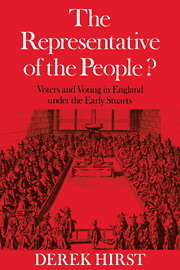Book contents
- Frontmatter
- Contents
- Acknowledgements
- Abbreviations and notes
- 1 Introduction
- PART I THE ELECTORATE
- PART II ELECTIONS
- PART III AFTER THE ELECTION
- Appendices
- I Constituencies experiencing franchise disputes 1604-41
- II Case studies of disputes
- III The borough franchises in 1641
- IV Contested elections
- V Numbers of voters
- VI Voting and occupations in Hertford
- VII The provisions of bills to regulate elections
- VIII The arguments for a wider franchise
- Notes
- Bibliography
- Index
VIII - The arguments for a wider franchise
Published online by Cambridge University Press: 15 December 2009
- Frontmatter
- Contents
- Acknowledgements
- Abbreviations and notes
- 1 Introduction
- PART I THE ELECTORATE
- PART II ELECTIONS
- PART III AFTER THE ELECTION
- Appendices
- I Constituencies experiencing franchise disputes 1604-41
- II Case studies of disputes
- III The borough franchises in 1641
- IV Contested elections
- V Numbers of voters
- VI Voting and occupations in Hertford
- VII The provisions of bills to regulate elections
- VIII The arguments for a wider franchise
- Notes
- Bibliography
- Index
Summary
An analysis of the arguments for expanding the franchise reveals again just how novel the issue was, in the speed with which sophistication and confidence was acquired from uncertain beginnings. But it also demonstrates how, in this period of reverence for the ancient constitution, the House could elaborate a novel constitutional doctrine in a mere twenty years.
The first two decisions to widen, over Oxford and Sandwich in 1621, did not raise particularly great problems. The Oxford debate centred on the terms of its charter, and a decision was facilitated by the fact that one of its clauses stipulated that its constitution was to be as in its parent, London, where a wider group than the corporation was involved. Accordingly, there were apparently no dissentient voices to the proposal for widening. Sandwich was dissimilar, and a pointer to later developments, in that it focused on custom as against executive fiat. The matter was fairly straightforward, however, for the exclusion of the freemen was recent, having taken place within living memory, orders from the end of Elizabeth's and the beginning of James's reigns being cited, and the mayor admitted that the commons had only been ‘debard … in two or three former elections of Burgesses’. The House was thus introduced gently to electoral reform, and the precedents for later intervention laid down fairly inconspicuously.
- Type
- Chapter
- Information
- The Representative of the People?Voters and Voting in England under the Early Stuarts, pp. 232 - 236Publisher: Cambridge University PressPrint publication year: 1975
- 1
- Cited by



